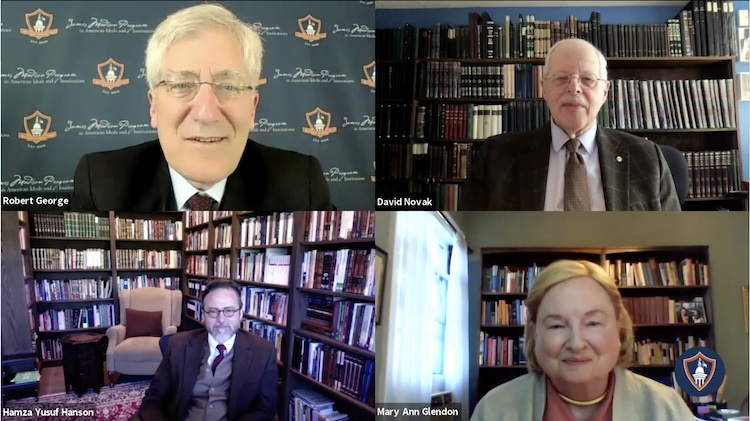Post-WWII, the United Nations Universal Declaration of Human Rights has proven to be a seminal document for modern moral multilateralism. Nowadays it can be easy to take the declaration for granted. Yet, the uniting of diverse peoples from across the world to affirm that humans, regardless of culture, ethnicity or religion deserve certain freedoms was a milestone for the pursuit of global justice.
Today, however, there is increasing debate over what exactly constitutes a human being, let alone a human right. For those on the Left the enterprise of universal human rights is an example of Western cultural imperialism. For conservatives, human rights can be a globalist force for eroding traditional values that conflict with the global progressive elite. Against this backdrop, Princeton’s James Madison Program in American Ideals recently hosted an ecumenical discussion on human rights.
Panelists included Princeton Professor and noted conservative intellectual Robert P. George and Harvard Law Professor Mary Ann Glendon, both of whom are Roman Catholic, as well as Islamic scholar Hamza Yusuf and leading Jewish philosopher David Novak.
“The competing positions are often framed… in terms of human rights,” George began. “Both sides claim to be the defenders of human rights. Both sides make their moral claims in the language of rights. Is that the proper framing? Or do we lose more than we gain in framing these profound moral questions about human rights?”
Glendon responded that “there’s a relatively small body of practical truths that are so deeply rooted in the world’s major philosophical and religious systems that they can plausibly be called universal, and those principles are what some people call natural law.” However, before getting to what can be considered a “human right,” the “starting point is always ‘what is your underlying conception of the human person?’”
Yusuf agreed with Glendon, saying that before defining human rights, we must first define what a human being is; if human beings have rights, then those rights must be for the sake of enabling humans to fulfill their duties. But then what essential responsibilities do humans have to themselves and to their families, communities, and nations such that the ability to fulfill these requirements defines the essence of humanity?
Yusuf went on to discuss the notion of a right to abortion as an example of something that does not constitute a human right.
“In a case like abortion, to me a human right would have to be self-evident, it would have to be something that we all agreed upon… The abortion issue has not shifted and that tells you about the issue itself… you’re not going to resolve it by simply saying it’s a right,” the Islamic scholar argued.
Additionally, Novak spoke about the issue of unelected judges determining what is and isn’t a human right, with or without the consent of the broader electorate. The landmark cases of Roe v. Wade and Obergefell v. Hodges, for example, saw judges and not legislators determining for the nation how abortion and gay marriage should be approached. Novak, quoting jurist Richard Posener, said that any kind of controversial ruling without broad public assent will ultimately be a pyrrhic victory.
George also challenged the panel to answer the objection that universal human rights are merely an example of Western cultural imperialism, as China, Iran and Saudi Arabia claim.
Glendon argued that charges of cultural imperialism are spurious because lobbying nations to live up to international law is not imperialism. There must be consensus for international treaties to be ratified, and that is the dividing line between legitimate multilateralism and imperialism.
Yusuf also added that some of the claims of cultural imperialism stem from the shifting nature of what is and isn’t covered under human rights. For example, then-Senator Barak Obama was on the record as opposing same-sex marriage during his 2008 presidential run but by the time of his second term in office he proclaimed support for it. Even though Obama was by no means an early proponent of same-sex marriage, after his shift anyone not in agreement was automatically “called a bigot.”
Furthermore, while the interlocutors agreed that cultural imperialism was to be avoided, they also stressed that moral relativism is also a threat against multilateral human rights.
Glendon, quoting Harvard political theorist Michael Sandel, said that Americans in particular love the idea of the “unencumbered self”; an anthropology placing the “free, unencumbered self-determining autonomous individual” above all else. But this is not the conception of humans we find in Judaism, Christianity or Islam, nor in classical philosophy. As Aristotle said: “The completely self-sufficient man is either a beast or a God.” For this reason, we need a self-conception that acknowledges how we are “constituted by and through our relationships with our parents, families, various intermediate institutions in civil society… and God.”






Comment by John67 on May 21, 2021 at 8:06 am
The “unencumbered self” is a child.
It is easily led off to Pleasure Island where it becomes a captive donkey.
It votes for the government to take over its responsibilities.